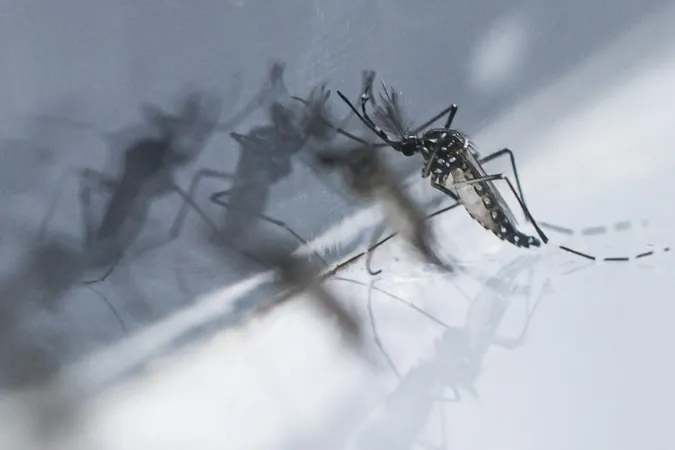
Singapore's Ambitious Project Wolbachia: A Game-Changer in Fighting Dengue by 2026!
2024-11-25
Author: Jia
Introduction
In a groundbreaking initiative to combat dengue fever, Singapore's Project Wolbachia is set to reach an impressive milestone by 2026, aiming to cover 50% of all households in the nation. This revolutionary project, utilizing lab-grown mosquitoes, is strategically designed to reduce the populations of the Aedes aegypti mosquitoes, notorious carriers of the dengue virus.
Current Progress and Goals
Currently, the project already supports around 520,000 households, equivalent to nearly 35% of the local residential areas. By its completion in 2026, it is anticipated that the initiative will extend its reach to approximately 800,000 homes, effectively encompassing major regions vulnerable to dengue outbreaks.
Announcement and Collaboration
Minister for Sustainability and the Environment Grace Fu announced the expansion during the opening ceremony of the 8th Singapore International Dengue Workshop held at the Jen Singapore Tanglin Hotel on November 25. The workshop, which will continue until November 29, is organized in collaboration with world-class agencies including the World Health Organization and the National Centre for Infectious Diseases, among others.
Background of Project Wolbachia
Launched in 2016, Project Wolbachia derives its name from the Wolbachia bacteria introduced to male mosquitoes in controlled environments. The concept is simple yet innovative: when these lab-released males mate with local female mosquitoes, their eggs become non-viable, causing a gradual decline in the mosquito population.
Impact and Results
Recent studies conducted by the National Environment Agency (NEA) reveal astonishing results—residents in areas populated with Wolbachia-infected mosquitoes face a 75% reduced risk of contracting dengue. In these affected zones, Aedes aegypti populations have been reported to decline by an astounding 80% to 90%. Furthermore, even individuals living in nearby regions—where Wolbachia mosquitoes were not released—benefit from a 45% decreased likelihood of disease transmission.
Community Engagement
Highlighting the synergy between community engagement and the Project, Ms. Fu noted that despite a higher number of dengue cases projected for 2023 and 2024, a major surge was tempered, thanks in part to both the project and community vigilance in controlling mosquito breeding.
Dengue Statistics
In the face of rising dengue cases, 13,057 infections and 15 deaths have already been confirmed in 2024 alone, up from 9,949 cases and six fatalities reported in 2023. Acknowledging these alarming statistics, in 2025, NEA plans to examine incorporating Wolbachia technology alongside other strategies to tackle significant dengue clusters.
Strategic Deployment
Moving forward, Wolbachia-Aedes mosquitoes will be strategically deployed in selected high-risk areas to enhance overall dengue control efforts. Although it typically takes three months post-release to observe meaningful mosquito population reductions, experts believe this initiative has the potential to mitigate the effects of extended dengue outbreaks.
Support and Facilities
To support the ambitious goals of Project Wolbachia, NEA and Verily Life Sciences, a subsidiary of Alphabet (Google's parent company), will expand two existing facilities dedicated to the production of these groundbreaking insects. A third facility is also slated for development to ensure adequate production capacity of Wolbachia-Aedes mosquitoes.
Conclusion
With advancements in mosquito control technology and strong community collaboration, Singapore is positioning itself as a frontline fighter against dengue, promising a safer environment for all its residents. Stay tuned as this story develops, and see how Singapore could be leading the way in global public health innovation!
 Brasil (PT)
Brasil (PT)
 Canada (EN)
Canada (EN)
 Chile (ES)
Chile (ES)
 España (ES)
España (ES)
 France (FR)
France (FR)
 Hong Kong (EN)
Hong Kong (EN)
 Italia (IT)
Italia (IT)
 日本 (JA)
日本 (JA)
 Magyarország (HU)
Magyarország (HU)
 Norge (NO)
Norge (NO)
 Polska (PL)
Polska (PL)
 Schweiz (DE)
Schweiz (DE)
 Singapore (EN)
Singapore (EN)
 Sverige (SV)
Sverige (SV)
 Suomi (FI)
Suomi (FI)
 Türkiye (TR)
Türkiye (TR)